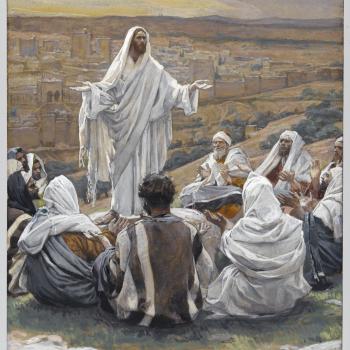How serendipitous for the Democratic party that the economic collapse is happening so happily under its watch. As President Obama’s chief of staff pointed out, we “should never let a crisis go to waste.” In fact, nothing should go to waste. That’s the whole point. The economic disaster has now been inextricably linked (how did this happen?) to the ecological question.
The problem is that fixing the economy and fixing the ecology are two different things, and blending the solutions presents, well, issues. The former requires a hard look at things like market derivatives and mortgage regulations; the latter focuses on energy sources, technological ingenuity, and alternative lifestyles. We can, and are, blending the two problems, but this may be a case of the sum of the parts being more than the whole.
Now if only we could bottle virtue, or at least what we call virtue today, and sell it for a profit! An elixir – green and greenbacked. Take a sip, and cheerfully begin darning socks and using a push lawn mower. Take another sip, and gladly sell your car, cut up your credit cards, and hang your clothes out to dry.
Green is so hard because we don’t really want to do these things. We relish our consumption. But if we could sell green goodwill, ah, then we could get somewhere. We could keep the great carousel of market spinning those capitalist horses of consumption and competition, innovation and insatiability, and still smugly reassure ourselves of our core goodness.
Imagine it. Cheers for downward mobility, for thrift, for more elbow grease and less fossil fuel.
We could save the earth, go green, and not worry about cap-and-trade taxes on our use of electricity. We could distribute life-saving drugs wherever and whenever they were needed, and still keep the pharmaceutical companies afloat with the power of sheer beneficence. We could abandon greed and gluttony, forswear consumerism and fashion, embrace frugality and monetary prudence without giving up public good, the generation of taxes and employment, or the stimulus for inventions and creative ingenuity.
Pope Benedict XVI’s latest encyclical, Caritas in Veritate, calls for, among other things, a worldwide redistribution of wealth and the recovery of a “spirit of gift” in economic decisions. And while many might laud the spiritual righteousness of such counsel, there are bound to be just as many who question the practicality of its implementation. What would happen if such measures were really embraced?
Bernard Mandeville fantasizes about such a possibility in his early 18th-century poem, “The Grumbling Hive.” Its bees are industrious and focused — in all the least virtuous ways. Fraud, dishonesty, crime, greed, pandering — these are the nectars that keep the hive humming. But the bees are then stricken with a moral remorse and, shockingly, become everything we instruct our children to be — honest, simple, hardworking, generous, thrifty. The hive collapses. Turns out the hive actually needed the rogues and their law-enforcing collaborators, the decadent and their spendthrift ways, the self-indulgent drones and the vain queen.
Thorstein Veblen turns a less piquant eye on the capitalist situation in his turn-of-the-century book, The Theory of the Leisure Class. His term, “conspicuous consumption,” invites the reader to contemplate the usefulness of greed, fashion, and leisure in the stimulation of the economy. In his theory, the upper classes buy and parade their economic superiority; this generates production, innovation, adaptation, and the employment of all those who create the goods to satisfy their lusts. The lower classes also benefit. They ooh and aah and thrash about with envy, working ever harder to emulate the style and consumption of the upper classes. Remove “conspicuous consumption”? What then?
Society will implode, that’s what then – or so Ayn Rand argues in Atlas Shrugged (1957). Rand’s posture of “ethical egoism” challenges the viability of an economic platform of compassion, generosity, sacrifice, and international altruism. The only grease that can keep the carousel spinning is the grease of rational self-interest. As we each employ our gifts and talents to their utmost – which will only happen if in fact we profit from that effort – then the entire community will benefit.
Private Vice, Public Benefit? That was Mandeville’s pithy summary of the problem. Is it true? Or is there some hope for the kind of world the pope envisions?
-Kmulhern












